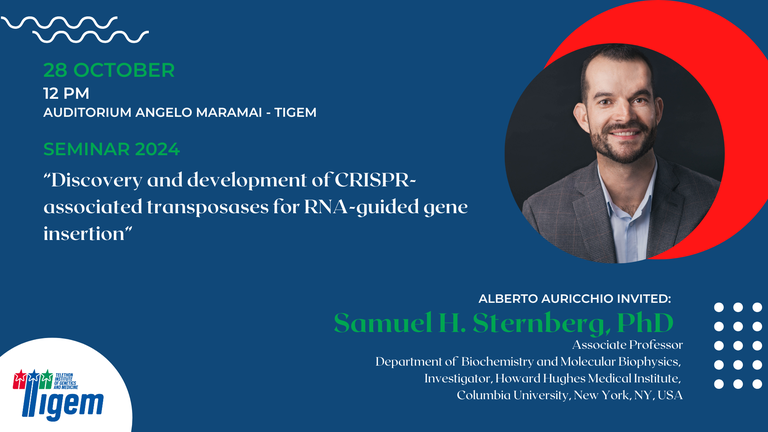Samuel H. Sternberg, PhD - "Discovery and development of CRISPR-associated transposases for RNA-guided gene insertion"
- When Oct 28, 2024 from 12:00 PM to 01:15 PM (Europe/Berlin / UTC100)
- Where Auditorium Angelo Maramai
- Contact Name Alberto Auricchio
- Contact Phone 08119230659
-
Add event to calendar
iCal

- https://www.tigem.it/newsroom/seminars/samuel-h-sternberg-phd-discovery-and-development-of-crispr-associated-transposases-for-rna-guided-gene-insertion
- Samuel H. Sternberg, PhD - "Discovery and development of CRISPR-associated transposases for RNA-guided gene insertion"
- 2024-10-28T12:00:00+01:00
- 2024-10-28T13:15:00+01:00
Samuel H. Sternberg, PhD
Associate Professor
Department of Biochemistry and Molecular Biophysics,
Investigator, Howard Hughes Medical Institute,
Columbia University, New York,
NY, USA
Short CV
Abstract
In recent years, genome editing technologies have advanced from nuclease-based methods that generate
DNA double-strand breaks (DSBs), which can cause undesired byproducts, to next-generation CRISPR
approaches that perform controlled chemistry using DSB-independent strategies. Base editing and prime
editing are ideally suited for small-scale modifications, but methods to achieve large-payload gene
insertion have been lacking. To address this gap, I will present work from my lab describing a new family
of CRISPR-associated transposases (CAST) that perform highly accurate, targeted integration of DNA
payloads via RNA-guided transposition. Unlike conventional CRISPR systems that combine targeting
and cleavage, CAST systems exploit nuclease-deficient CRISPR systems for RNA-guided DNA
targeting, leading to the site-specific recruitment of transposase enzymes for DNA insertion. We have
resolved molecular details of this pathway using a combination of high-throughput sequencing,
biochemistry, genetics, and cryo-electron microscopy, revealing a hierarchical assembly pathway and a
structural roadmap to guide engineering efforts. More recently, we leveraged phage-assisted continuous
evolution (PACE) to identify transposase variants with ~200-fold improved activity in mammalian cells,
yielding 10–25% integration efficiencies of kilobase-size DNA cargos across several human genomic
sites. Our long-term goal is to harness CAST as a versatile platform technology for integrating
therapeutically relevant DNA payloads into the genome to treat human disease.
